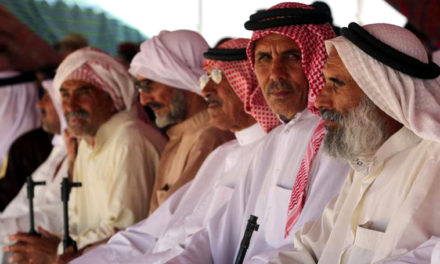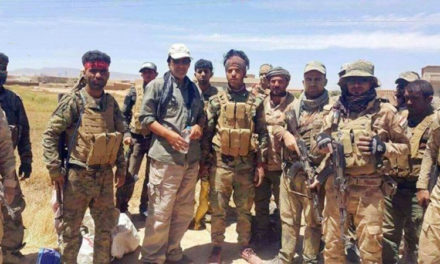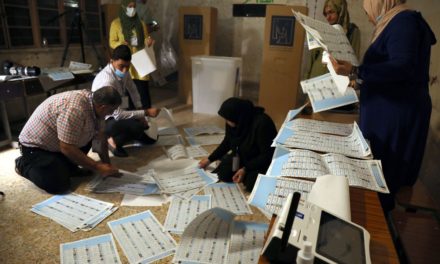Data on the distribution of displaced Sunnis from UNHCR appears to contradict claims of systematic cleansing of Sunni communities by Shia paramilitaries.
Iraqi armed groups fighting ISIS have been gaining significant ground since October last year. Iraqi Security Forces, Popular Mobilization Units and Kurdish Peshmerga have all successfully retaken swathes of territory that had been occupied by ISIS since June 2014.
But every military victory has been accompanied by voices of concern about the fate of local Sunni communities. Numerous media reports have cited eyewitness testimony that allege mass evictions of local Sunni civilians and the destruction of their homes by Iraqi armed groups.
While some of these accusations have been leveled at Kurdish Peshmerga, much has focused on the conduct of Shia paramilitary forces. The evidence remains fairly sparse, but one can be sure that such instances exist. On January 7, Grand Ayatollah Sistani issued a fatwa calling on all individuals fighting ISIS to refrain from harming innocent civilians or attacking their property. The big question is whether these acts are isolated incidents, or represent a systematic effort, orchestrated by senior commanders, to cleanse liberated areas of their Sunni populations.
One can cite several instances where Shia paramilitaries have fought side by side with local Sunni tribal fighters. The Sunni town of Dhuluiya, which was liberated in December, offers a good case in point. It is widely known that the Sunni Albu Nimr tribe publically called for assistance from Badr and other paramilitaries in November, and most recently, tribal chiefs in Ramadi requested support from Kataib Hizbollah.
The first accusations of large-scale forced displacement of Sunni communities by Shia paramilitaries came in November after the liberation of Jurf al-Sakhar, located 40 kilometres southwest of Baghdad in the province of Babylon.
A New York Times report on 6 December 2014 claimed that Shia paramilitaries “drove out the last of the town’s civilian residents — about 70,000 Sunnis.”
The piece quoted Sunni lawmaker Maysoon al-Damluji saying, “There are concerns this could be ‘ethnic cleansing’ of Jurf al-Sakhar and the Baghdad belt.”
However, data released by UNHCR on 7 January 2015 appears to dismiss claims of ethnic cleansing in Jurf al-Sakhar. The report reveals that there are a total of 8,334 internally displaced people from the entire province of Babylon. While it is not possible to ascertain the sectarian background of these IDPs, it is noteworthy that while the majority have remained within the province, some have chosen to travel to southern Shia provinces including Basra, Dhi Qar and Karbala.
A closer analysis of the data also appears to lend credence to the view that attacks on Sunni civilians by Shia paramilitaries are by no means systematic or on a large enough scale to warrant being labeled as ethnic cleansing.
Shia paramilitaries have a heavy presence in the southern provinces, and yet, as the data clearly shows, a significant proportion of displaced Sunnis have chosen to settle there.
All southern Shia provinces, with the exception of Muthana are hosting IDPs from Sunni-majority Anbar, Mosul and Salah ad-Din. Of the 2.1 million IDPs, some 257,000 have settled in the south. In addition, Baghdad is hosting over 108,000 displaced persons from outside the capital. Here are some key observations:
- There are a total of 12,500 IDPs from Anbar in the south, with some 4,218 in Karbala alone.
- IDPs from Mosul province residing in the south total over 220,000, including 80,000 in Najaf and more than 60,000 in Karbala. Granted, however, that the majority are likely to be Shia Turkmen from Tal Afar, Basheer and other villages that were attacked by ISIS in June 2014.
- Furthermore, nearly 5,800 displaced persons from Salah ad-Din have been hosted by southern provinces, including 2,214 in Basra.
While there is good reason to be worried about the long-term motives of armed groups that are not under the formal control of Iraq’s military institutions, it is important not to over-dramatize what is currently taking place on the battlefield. Instances where innocent Sunni civilians have been attacked should be highlighted and condemned, but one should equally acknowledge occasions when Shia paramilitaries have fought to protect Sunni communities from the onslaught of ISIS.

Ali Hadi Al-Musawi
Ali Hadi Al-Musawi is an Iraqi analyst and contributing writer at 1001 Iraqi Thoughts.









